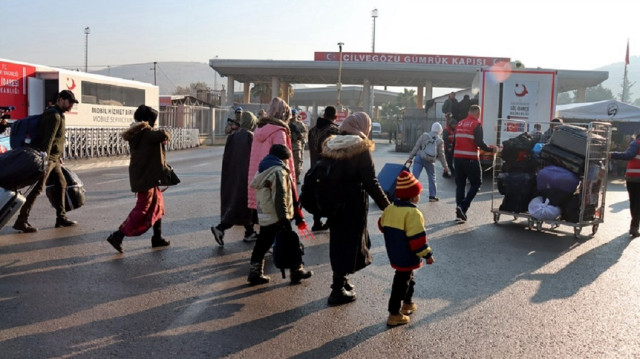
‘We are asking for $310M so that we can help up to a million Syrians who might return in the first six months of 2025,' UNHCR spokesperson tells Anadolu
The return of millions of Syrian refugees and the reconstruction of the war-torn nation depend on international support and improved conditions in the country, according to a UN refugee agency's spokesperson.
UNHCR spokesperson William Spindler told Anadolu that Syria has endured the world's largest displacement crisis over the past 13 years, with nearly 13 million Syrians forced from their homes.
“Seven million inside Syria and 6 million refugees in many parts of the world, in Turkey, Lebanon, Europe and in many parts. Many of these Syrians would love to go back to the country,” Spindler said.
“Many of these Syrians would love to go back to the country. This is what they have told us. They are waiting to see what happens inside the country before they can return. We see that the situation is improving. The security situation is getting better,” he added.
Despite some progress, Spindler noted that air safety concerns and continued Israeli airstrikes in Syria remain obstacles. He added that UNHCR has resumed its operations in Syria, with facilities operating at 80% capacity.
“We have seen movements across the borders. But this is not new. The borders between Syria and its neighbors have always been the scene of movements. People come and go. So, this has not changed,” he said.
“People are still coming back to Syria, not in huge numbers, but we have seen people returning from Turkey, Lebanon and other countries. But also, we are seeing some Syrians leaving because the situation in Syria has changed. We don't have exact figures at the moment because on the Syrian side of the borders, there is no presence of the authorities so far,” the UNHCR spokesperson added.
“There is no nobody registering entries and exits of people. So we have some information from the authorities of the other countries, but not from the Syrian authorities. So we don't have official figures, but we know that thousands of Syrians have returned, Particularly in the beginning of the first days after the fall of the regime, we saw hundreds and a few thousand Syrians leaving. Now those numbers have gone down,” he said.
- ‘We do not want people to return and be displaced again'
Spindler said they have access to some information from neighboring countries.
“For instance, from Turkey. Recently, the authorities gave a figure of some 7,600 Syrians who have returned to Syria. This is a very small number. So, so far, the numbers are not huge. We know also from Lebanon, there have been a few thousand Syrians who have returned, and these numbers continue to grow. But at the moment, we have not seen mass return, because many people are still waiting to see what happens on the ground.”
The UN official emphasized that the majority of the six million Syrian refugees worldwide wish to return to their homeland, saying: “Nobody wants to be a refugee. Nobody wants to be living in exile.”
He also pointed out the importance of ensuring safety and security for Syrians to return without fear.
“We do not want people to return and be displaced again,” he said, adding that meeting basic needs is crucial for this.
- A call for global aid
Spindler emphasized the need for international assistance to ensure safe and sustainable conditions for returnees.
“We are asking for $310 million so that we can help up to a million Syrians who might return in the next … in the first six months of 2025, this is our hope. The international community needs to support the reconstruction of Syria,” he said.
He also stressed the importance of a stable government in the country to safeguard the rights of those who are returning and those who are already in Syria.
While acknowledging the challenges of providing essential services in the short term, Spindler highlighted the medium- and longer-term necessity of involving Syrians in rebuilding their country.
“Syria needs all the skills, the talent, all the hard work of all the Syrians who are outside the country to return and to help in the reconstruction of the country. You have young people who are ready to work for the country,” he said.
“So in the long term, it's important that these people can return and help in the reconstruction of the country, but we need to help them. We need to facilitate that. We need to be there for them so that when they come back, we can help them. And for that, the international community needs to help Syria,” he added.
Bashar al-Assad, Syria's leader for nearly 25 years, fled to Russia after anti-regime groups took control of Damascus on Dec. 8, ending the Baath Party regime, which had been in power since 1963.
The takeover came after Hayat Tahrir al-Sham fighters captured key cities in a lightning offensive that lasted less than two weeks.

